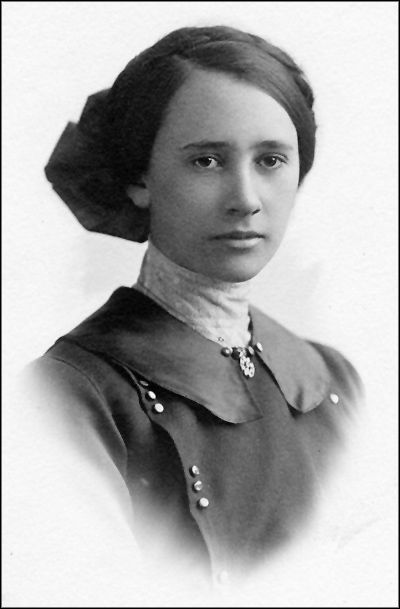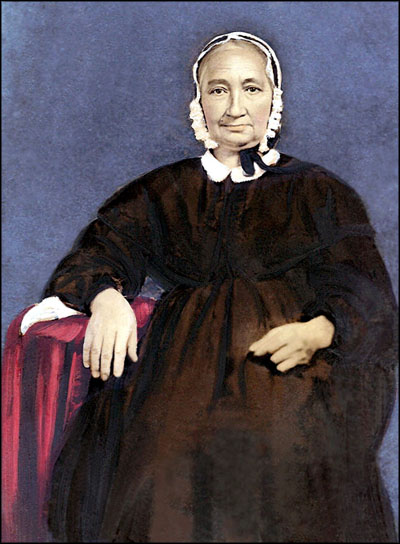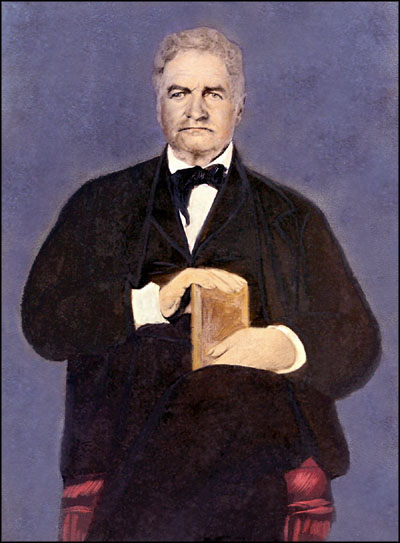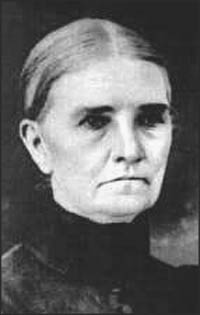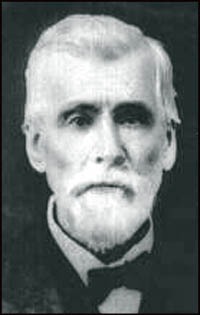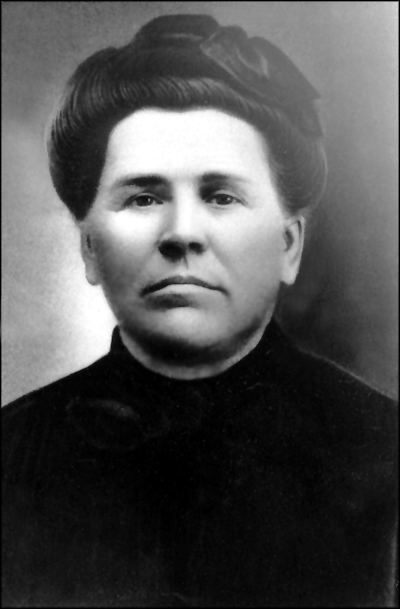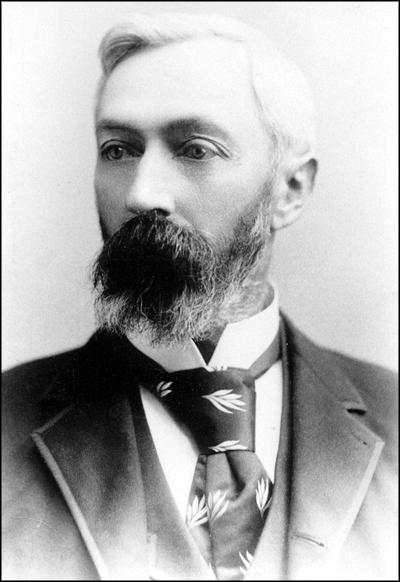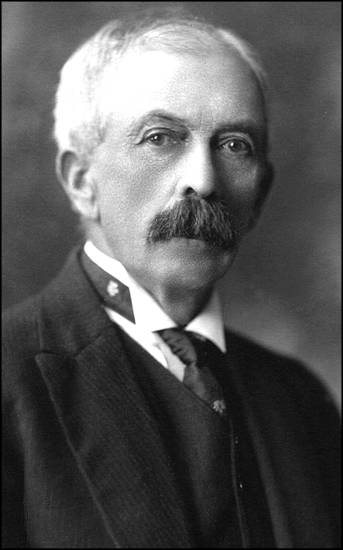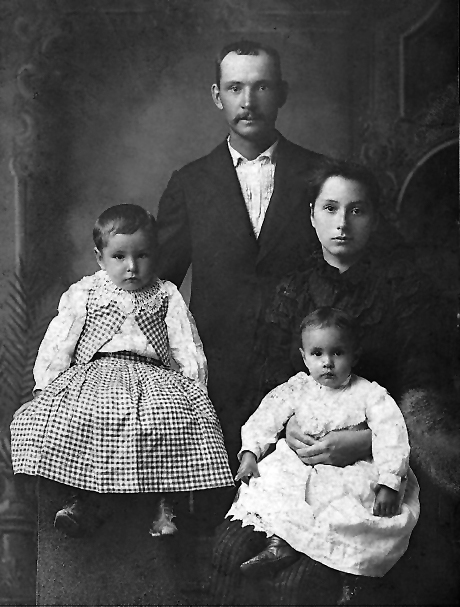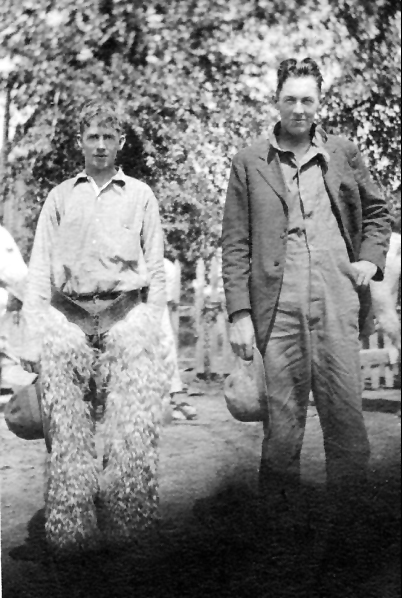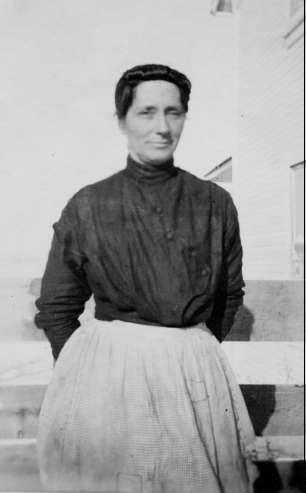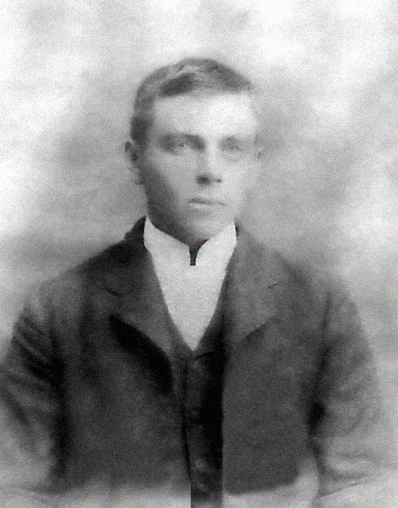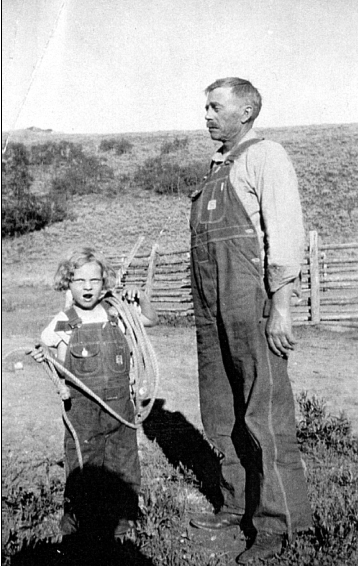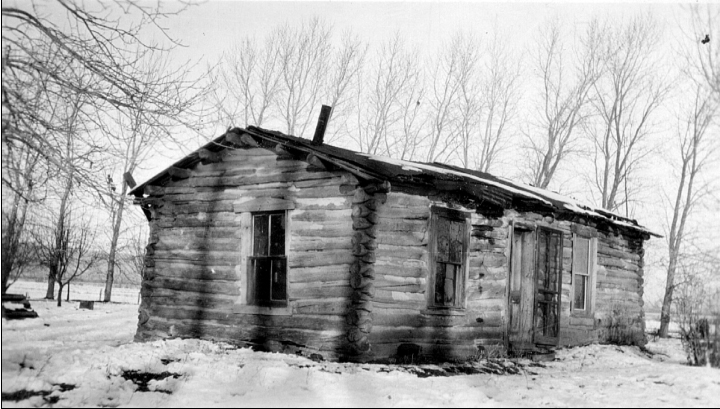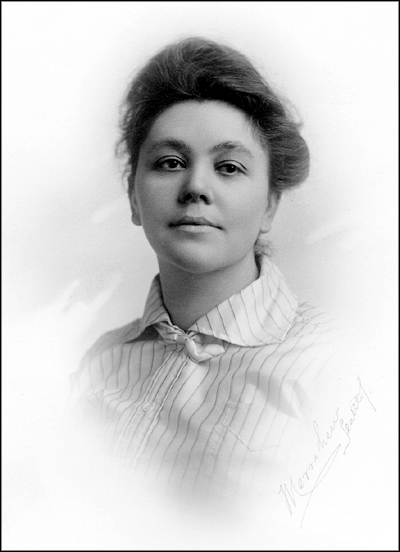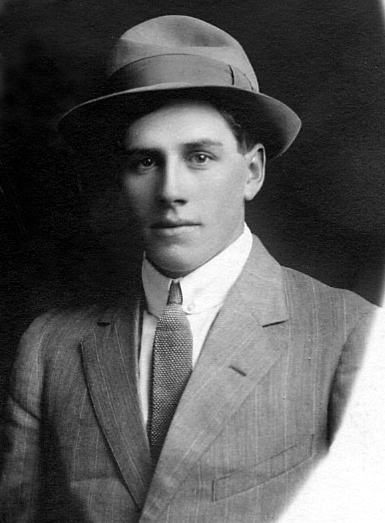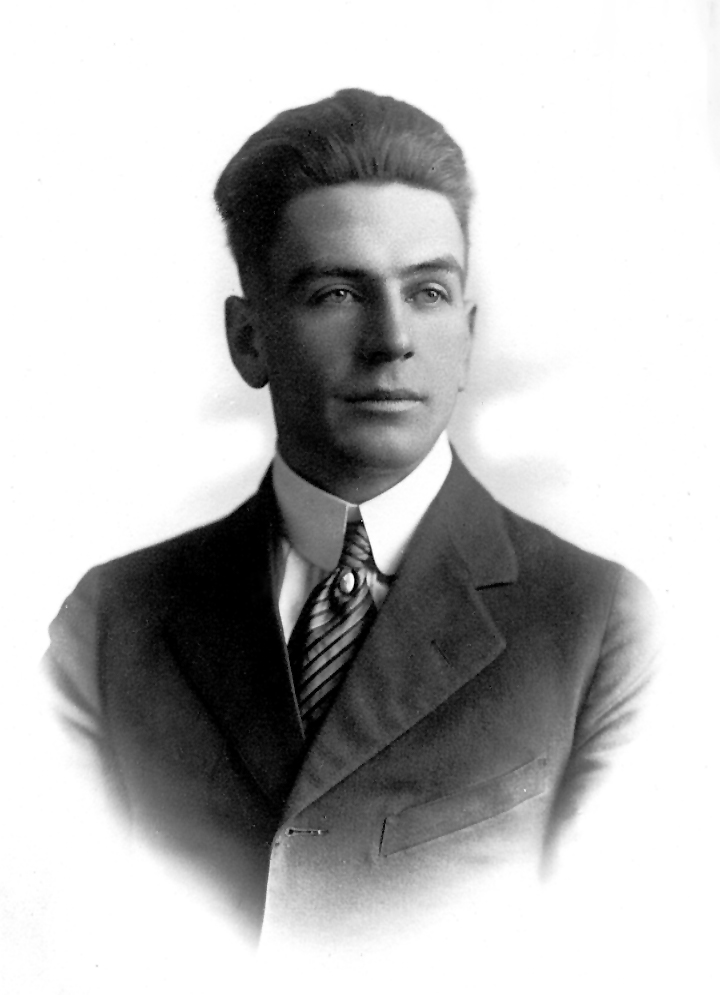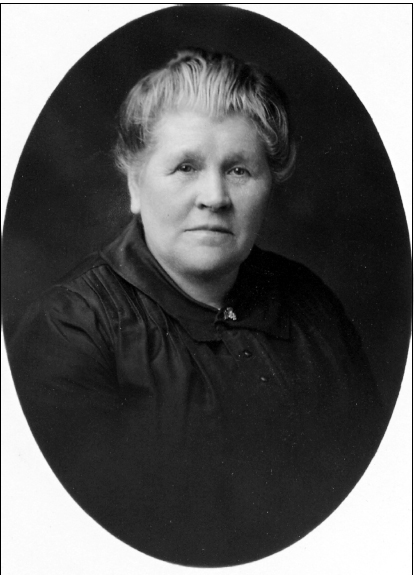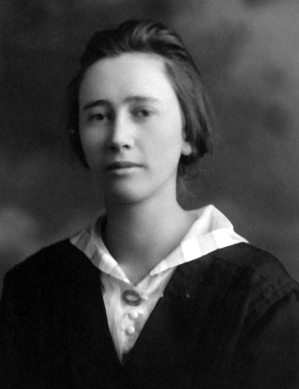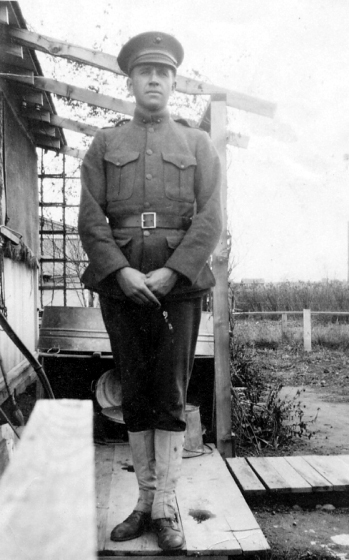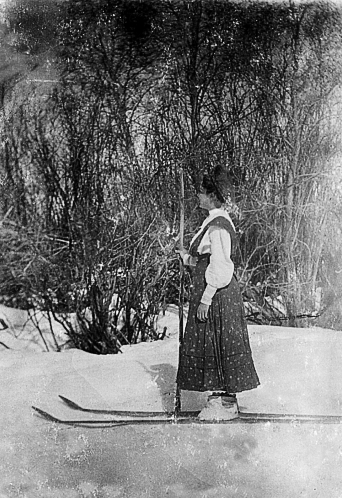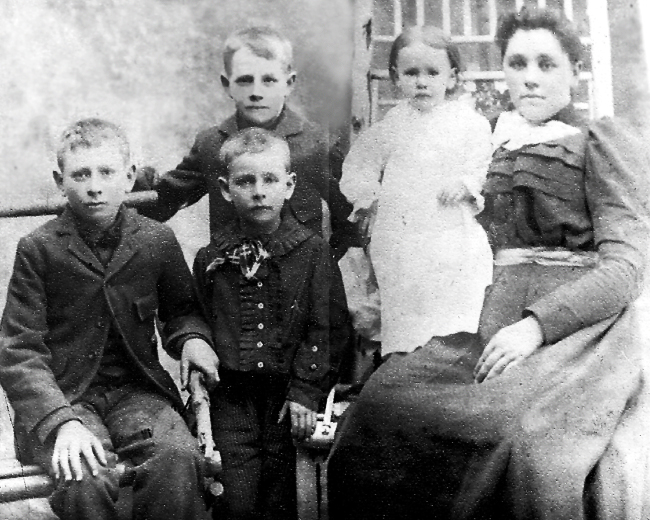McCarter Family History
by Kate Rosamond McCarter Weaver
In 1886 H.F. and Mary McCarter left their home in Grayson County, Virginia to homestead a ranch on the Camas Prairie in Idaho. Their eighth child, Kate Rosamond McCarter, was born there on March 22, 1898.
As one of the younger children, Kate spent a great deal of time with her mother while the older kids helped with the ranch work. Mary enjoyed telling her daughter stories about the family they had left behind in Virginia. Kate had a good memory for these stories and, when she was in her late seventies, was asked by her nieces to record them for future generations.
Her stories are presented here in their unedited form. Please keep in mind that, as with any family history, the events she describes are based on family legend as much as fact. Footnotes have been added to update the family information learned through subsequent research.
Let's begin with two sisters, Susan and Mary Jane Thomas, who lived in the Blue Ridge Mountains near the border of Virginia and North Carolina.1
Susan married Levi Williams and raised a daughter named Thursie. Thursie married Phineas [Philander] McCarter after buying his bond from someone who brought him over from Scotland as a bound servant.2
Phineas McCarter became an ordained Methodist minister, but made a living from a farm in Virginia and later in North Carolina.
My mother [Mary Jane Senter] had a slightly different story about Grandpa. She said he came from New York state peddling tin ware and was called "Honest John." He was a wood's colt [born out-of-wedlock].3
Sallie learned about the bound servant version from a cousin she corresponded with after the children were all married and she didn't have so much work to do. She also learned that they had a crest - had traced the ancestry back far enough to get a noble for the family tree.
Phineas and Thurza raised a family of ten children - three girls and seven boys.4 Ma said they were a fine-looking lot.
Four of the boys were in the Confederate Army during the Civil War, but Pa [Hugh Franklin], Jim, and George were younger and stayed home to help with the farm. Another of the younger ones was Emily who married a widower with a large family of small children and made a good mother for them. I did know the names of all my uncles and aunts, but can only remember that some of the older ones were Van Buren, Will, and Jane.
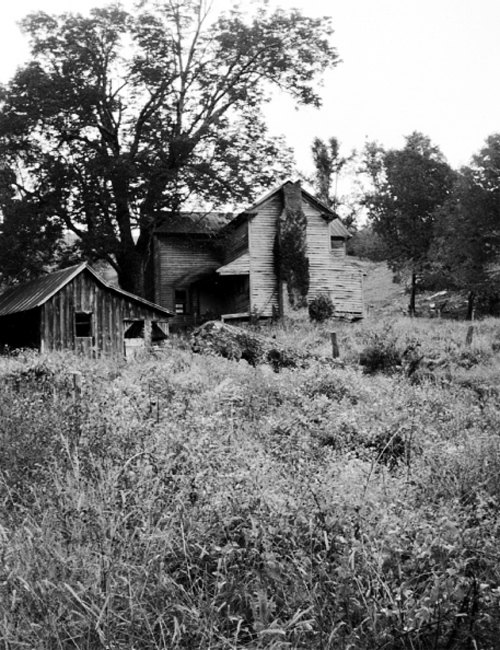
Site of Philander and Thurza's home on Briar Patch Mountain
(aka McCarter Mountain) in Elk Creek, Virginia
This home belonged to their grandson
William Francis McCarter.
Mary Jane Thomas and Robert Pugh
Mary Jane Thomas married Robert Pugh [on January 23, 1817]. He was the son of Sam Pugh whom King George had given a grant of land at the time when Indians were raiding the rich tobacco and cotton plantations near the coast.5 The policy was to form a buffer of farms in the mountains to protect the plantations. The farms were to be settled by sturdy Scotch, German, and Irish. Ma said that many of the farms where she was raised were said to be part of the old Sam Pugh grant.
Ma's grandfather, Robert Pugh, gave his slaves their freedom some years before the Civil War started and hired them to work if they wanted to stay. Some of the young ones left, but all the older ones stayed. Ma couldn't remember, but she thought he only had about seven slaves.6
She said that when she was small, the negro children were nicer to play with than the white ones she knew. After she was married, she had a friend who was black that came and helped her with her work when she needed her. Ma called her Carline - pronounced "car" as in automobile.
Ma's grandmother, Mary Pugh, had black snapping eyes which seemed to shoot sparks when she laughed or got mad. Maybe Susan Williams' were like that too, because she was known as "Old Sukey Williams the Witch" after she was old and her family were all gone away from home. No one bothered her though - just avoided her. The neighbors were kinder there than the ones in New England where witches were burned or drowned.
As I remember, Robert and Mary Jane Pugh had nine children, one of whom was Rosamond - pronounced "Rawsamond" so she was called Rawsie for short.7
Rosamond Pugh and Calvin Halbert Senter
Rawsie married Calvin Halbert Senter whose parents were Drury Senter and Mary Jane McClure. Mary Jane came from Scotland with her parents, and Drury followed as soon as he earned enough money for passage. They were married soon after his arrival.8
Grandpa was "sandy" Scotch and Grandma was "black" Scotch. I believe the black Scotch are highlanders and Catholics, and the blonds are lowlanders and Protestants. However that may be, Drury Senter was a hard-shell Baptist preacher. Drury and Mary Jane had a store that Calvin worked in to save the money to buy the old Sam Pugh home place. The old house had burned down, so he built a nice new one for his bride.9
When Calvin brought Rosamond to the new house after their wedding, they found a young black girl there who had been trained to cook and keep house. She was a wedding gift to Rosamond from her parents. She was a surprise to Calvin, no doubt, because he made her pack up her things and, although it was getting late in the day, took her straight back to where she came from. Rosamond thought she might have stayed all night, but he wouldn't stand for that - he didn't believe in slavery and didn't want one around.10
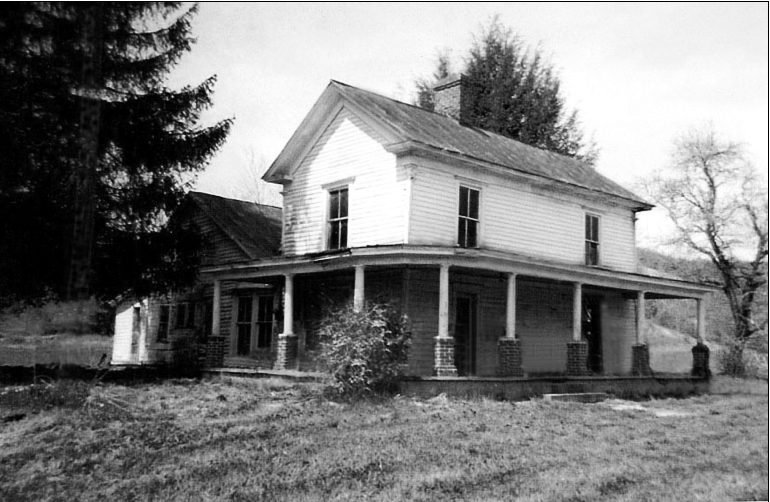
Old Senter House at the Mouth of Wilson, Virginia
Rosamond knew nothing of keeping house, so Calvin had to teach her how to cook and keep house. They cooked over a fireplace in those days. She did know how to sew and milk a cow, though. At one time it was the fashion for the young ladies of the family to milk the cows. Marie Antoinette of France had a farm where she and her court lived at times when they became tired of the court life and did all the farm work for a week or so. Maybe that is why American girls took up milking cows.
When the Civil War came along, Calvin, who didn't believe in slavery, volunteered because he did believe in States' Rights. He left Rosamond with two little ones - Ma and her brother Kenny. He wasn't wounded, but was captured and spent considerable time in prison where he caught measles and almost died.11 He came home in poor condition, but did recover. He was a Captain and most everyone called him "Cap" after that, and many folks came to him for advice about various things.
They had eight children.12 Two boys, Kenneth and Wiley, had red curly hair. Ma had ordinary brown hair and one of the girls, I think Ellen, had red hair, and Ann's was honey colored. The only other name I can remember was Betty. She married a Gore and Ellen a Halsey.
Mary Jane Senter and Hugh Franklin McCarter
Having two grandmothers who were named Mary Jane, naturally, Ma was Mary Jane - only they pronounced it Merry and left off the Jane. She was 17 and Pa was 30 when they were married and he took her to live with his mother.
Pa had taught school before they were married. In fact, Ma was one of his pupils for a while. She only went through the fourth grade. He had also taught Latin in a girl's seminary for a time. Lalla told me he had been all over the west. Ma said he and his brother Jim let mail routes in Texas one year.
Before Orla was born, when Lalla was a little thing, they moved to West Virginia and leased a farm. But that didn't turn out too well, so they came back to Virginia and got a farm there. Orla was born in West Virginia. Then Sallie and a baby, Kitty Clyde, who died with whooping cough, were born in Virginia.
In 1886, Pa went to Idaho and filed on a homestead and built a house on the western part of the old home place.[Hugh and Mary settled on Corral Creek in what is now Camas County.] Ma followed with the children in an emigrant car on the railroad. Those were just empty box cars with a stove in one corner for warmth and cooking. The passengers had to take turns with their cooking, so they didn't always get to eat on time. Their beds were made up on the floor, or maybe there was a shelf along the side for some of them. It seems to me that Ma said it took them three weeks to make the trip which was, of course, a great improvement over the covered wagons of earlier years.
Sometime while they were proving up on their claim, they bought two other claims. One was called the "Old Bob Place" and there was still the wreck of a shack and cellar near the horse corral in our pasture back when I can remember. The other claim had a good log house and Pa built another room on the back and a kitchen-dining room, milk house, and cellar in an "L" shape. The cellar was of double walls with about two feet of sawdust in between the walls and sawdust overhead too. There was a porch across the front of the kitchen and milk house. They had a nice house and a dandy farm.
We always had a few chickens for fryers, stewed chicken and dumplings, and eggs. Sometimes there were eggs to trade along with the butter, especially in the summertime, but the hens didn't do so well in the cold weather.
Ma kept her milk in shallow pans in a curtained cupboard beside her work table, and each morning she strained the milk off the cream and worked and molded her butter. She had no trouble selling all the butter we didn't use. Some people came to the house to buy it, and the rest was taken to Soldier to trade for staples such as coffee beans (we ground it ourselves), brown beans, salt, sugar, etc., also material for clothing. Later, there was a creamery built at or near Corral and we bought a milk separator and sold cream to the creamery. That must have been when we started buying our clothes, etc. from Sears and Roebuck or Montgomery Ward. In the fall Pa, and later one or two of the boys, would take a big wagon and go to Hailey for supplies for the winter.
Ma always knitted stockings and socks for the whole family and, after she didn't have to do that anymore, she knitted a white bedspread - a beautiful thing. Sallie told me that Ma did all the sewing for herself and her sisters while she was growing up because she could take such dainty stitches. It was all done by hand then. She had a Singer sewing machine with a treadle when I was growing up.
The dresses she made for me always had a band around the neck, long sleeves with bands at the wrist, and a band between skirt and waist. They came about half-way between my knees and my ankles. I always wore aprons with bibs and straps that crossed in the back. Mattie made several dresses for me after Will met her. She was always a master seamstress and the clothes she made never looked homemade.
Ma had a big brown shawl that she always wore when I was little. I remember one time we were walking home from Sunday School and the wind was in our faces. She was carrying Earl and the wind took his breath, so she put the shawl over his face so he could breathe.
When the preacher came to our country, he always stayed with us. Ma started and ran a Sunday school for several years until some of the older ones of the younger generation thought they didn't like the way she was doing it, so they took over and, in a short time, there was no Sunday school. Some of the folks wanted Ma to come back, but she didn't.
When she died, the minister who preached the funeral sermon said that she was a friend of his and what a wonderful woman she always was. I was surprised to hear him say it, although I knew they were acquainted and Arlo and I went to him to be married.
Lal told me that Pa worked hard getting the farm into shape and it was a beautiful place. They made a good living on it until he got to wasting money in Hailey when he went after winter supplies.
One year he was elected representative to the legislature from Blaine County on the Populist ticket (that was before Blaine was divided into Blaine and Camas). But, perhaps he became discouraged at seeing what little there was he could do, so he spent the time running around, drinking, and having a good time.
When he was getting along toward 60 he had a stroke which left him lame in one leg. But it may have changed his nature too, because he became mean and hard to get along with. Ma was very bitter and almost never said a good word about him, but the older children seemed to have love and respect for him. The boys called him "Old H.F.," but not to his face. But that didn't mean much since almost everyone was "Old So and So."
The crowning indignity from Pa came when he sold all the cattle for $10,000, gave Lalla $1,000, went off to California to visit his brothers Will and Jim, and let two strangers swindle him out of the whole $9,000. Uncle Will had moved to Long Beach and raised a big family and Jim was there some of the time.13
Jim never married and was always rather foot loose - had a silver mine on the other side of Soldier Mountain he called the Tyrannus after the state motto of Virginia, Sic Semper Terannus. I never saw any of my uncles or aunts.
Then Pa came home and sold a horse, so Ma decided she would have to do something and went to a lawyer who advised her to get a divorce. They arranged it so she had full control over all the rest of the property, and he couldn't sell anything off the place after that.
I think Ma got some money from Grandpa's estate and used it to buy more cattle after Pa sold the others. She also had a little money to invest in a fake eucalyptus plantation when a couple of slick salesmen came to the Prairie. She gave them a note for the balance she couldn't pay cash for. After everybody found out it was a fake, she was able to get her note back, but the money was gone.
Pa lived with Orley for years and then came back to the home place after Will took it over. He lived with them for a few years, but usually came to Boise for the winter. Pa was past 80 when he died. A newsboy ran into him and knocked him down on the sidewalk in Boise and broke his hip. He was in the hospital for months but apparently it wouldn't heal. Then when he did get to where he could sit up, his hard arteries made so much of a load on his heart that he would have to lie down again. So he never did get out of bed.
Lalla Emolin McCarter
Lalla Emolin was the oldest of the family and was born while they were still living with Pa's mother. She was rather tall and always wore her hair parted from ear to ear over her head, combed forward and rolled under above her brow. The back section was in a bun at her neck. I suppose that was the style when she was young. She used to help Pa with feeding stock and chores and let Sallie help with the housework because she said Sallie always wanted to do everything just so, and Lal didn't like to be bossed.
She wanted to be a school teacher, and Ma had her all ready to go to Boise to school when she was about 16. But Pa was to drive her to meet the stage at Mountain Home or Bliss, and he refused to take her. So she married Dave Harness instead. Ma decided afterwards that Dave had talked Pa into not letting her go just so she would marry him. I expect Dave was sorry for it afterwards.
They had a nice place to live and a good farm and four kids, Edward Martin, Stella Lena (Mrs. Mordia Grindstaff), Laurence, and Mark.
Laurence was a most charming and kind lad that everyone liked, but he was killed by a horse when he was 19.14 Dave had given him the team and, of course, Lal was mad at him for the rest of his life saying he knew the team was unreliable and had given them to Laurence hoping they would hurt him, which of course was completely silly. Lal had thrown Dave out years before for drinking too much. When she got mad at anybody it really lasted, but if she liked anyone she just couldn't do enough for him or her.
Mark also died young. He was married and had a daughter, but he couldn't have been over 30. Lal thought a horse killed him too, but Eddie said he had a bad heart and was expected to go most anytime unless he was very careful. He was to stay off a horse, but he went for a ride and apparently died and fell off.15
Eddie and Stella were both older than me, but I played with them a lot, and we exchanged magazines with Lal right along, so there was an excuse to go to their house at least once a month. I used to go home with Stella from school and stay all night, and she would come with me sometimes.
One time when we were there (Ma was along this time to help with the work) Lal had her foot propped up on a chair because her knee was swollen. She had rheumatism even when she was a girl. She told me that once she was so bad that Pa carried her upstairs to bed and the other children laughed at her, so she wouldn't let him carry her anymore but crawled up on hands and knees.
Lal was a hard worker and ran the ranch with the help of the kids after Dave left. She must have hired the hay harvested, but she always had a luscious garden and was the envy of all the neighbors. Ma finally decided that it was because her garden was on a mild slope toward the south and the sun shone warmer on it than on level ground in the spring. Also the hills were not too far away and may have sheltered it from the cold winds. She had watermelon and tomatoes that got ripe.
Only once, that I can remember, did we have ripe tomatoes and Ma had gathered them while they were still green before it frosted. She always had her tomatoes started in cans or something before it was warm enough to put them in the ground, but that didn't help much. She used the green ones for preserves and piccalilli, so we got some good from them.
After the children were married, Lal sold her place and bought an acreage near Weiser where she could still have cows and chickens. Then later, she sold that and bought a house in Weiser. She had chickens there for a while and took care of her lawn and garden, but gradually stopped doing any work. Her knees were bent to the sides in a bow, but she could still walk the last time I saw her. She had to have a walker toward the last.
Stella did all her work, cooked her meals, washed her clothes, etc., until Lal fell and broke her shoulder and had to go to the hospital. Stella told the doctor that she would die if they made her go there and, sure enough, she did - just couldn't stand being away from home. She was 82, or anyway past 80.
Orla James McCarter
His middle name was James and, although his first name was spelled Orla, it was always pronounced "Orley." It must have been the custom then to sound an "a" on the end of a name as "ie," or maybe it was just our family.
I think he was most always kind and gentle, but he could get cross and stubborn. Sallie told me he was happy as a lark before a dance - whistling and singing - and next morning he was really grumpy and would hardly say a word.
Earl was born on his birthday and some of the boys started teasing him about his birthday gift, and he was really cross. But I think of him as jolly and bringing gifts. He called me "Kathryn," so did Card, Will, and Lal. He also re-named Earl as "Tobe," Claude as "Sam," and Card as "Johnny," so they all started calling him "Pete." Card was known as "Slim" by the neighbors and friends, because he was.
Orla herded sheep to make enough money to buy himself a farm at Carey. He raised good alfalfa hay there, so the boys used to drive the cattle to his place in the fall and bring them back in the spring to summer on the forest reserve.
His lips were always sore and cracked from the sun and wind until Ma talked him into letting his mustache grow then - no more trouble.
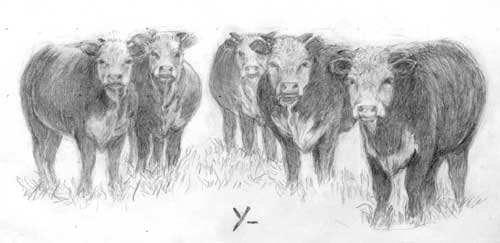
Orla's Cattle by Irma McCarter Petrick
One winter some of the cattle got lumpy jaw and Orla got it on his face. It wouldn't heal and kept spreading until finally he came to Boise for X-ray treatments. The only doctor who knew how to use the X-ray was out of town, and he had to wait a day or so in the hospital. All he did was walk the floor, although he said it didn't hurt to amount to anything.
Then after the first treatment he came home (that was after we had moved to Boise) and was sitting in Ma's big chair with his feet propped up on the reservoir of the range and went sound asleep. When he woke up he remarked that that chair was the most comfortable chair he had ever sat in, but we thought that it was because his face had finally stopped hurting.
I don't remember how many treatments he took, but his face healed completely, but was scarred. The comment by the other boys, or someone, was that if he would wash or shave occasionally, he probably would never have got the disease in the first place.
I never saw his home, but at one time the boys said he had it full of dogs. Apparently all of the strays ended up at his house. He liked dogs, and they like him. But he got rid of them sometime before he got married. He never married as long as Pa lived with him, but soon after his death he married a widow with four children who had cooked for him during haying. They were quite happy so far as anyone knows.
One of the boys, Willard Esterholtz, had been crippled by polio or chicken pox when he was a baby, so he couldn't work on the farm and was a bookkeeper in Boise when I met him. Mary Jane, Orla's daughter, stayed with us one year and went to business college. Willard used to come to see her, so we got acquainted with him. He told me that Orley treated all of them better than most real fathers would have done. Mary Jane told me that all the money that Pa said he was giving to Orla to help him get started never went to Orla at all.
Pa had always said that he would help Orla, then Orla could pass it on and help the other children because Ma objected to him giving so much to Orla and nothing to the others. He even "gave" Orla a wagon, which he never got either. Orla did help me though. He rented the piano for me to practice on when Sallie had me taking lessons, besides buying me a second-hand piano while we still lived on the Prairie. He also bought me a bicycle to ride to work after we moved out on the bench.
He lost his cattle by not selling at the right time. He had borrowed money from the bank and could have paid off, but decided to keep his steers another year thinking the price would go up. But it didn't and the bottom dropped out, so the bank took his cattle. He started raising hogs after that and did all right.
He and Mary had been living in an old log cabin that the original settler had built on his place. But one day, after all the children were grown and married, they came home from town and found it had burned to the ground. They had insurance or money from somewhere to build a nice new house. But Mary wasn't happy in it - said it just wasn't like home. But at that time they hadn't been in the new house more than a year or so, and I didn't see them again. They lived there until Mary died of cancer and Orla had to go to a home for the aged for a few years before he died.
Sarah Lena McCarter
Sallie Lena was the last of the children to be born in Virginia. She didn't like the Lena and never used it. For some reason Earl and I called her "Sowl" and Lalla "Lowl." Maybe Earl couldn't pronounce those sounds when he was learning to talk.
Ma told me she had a bad sick spell when she was just a baby, and afterwards she got too fat and always was fat. But some people thought she was beautiful.
Card told me she was engaged to a young man when she was 17, but he was killed in a snow slide. So she went to Boise and took nurse's training at St Luke's Hospital. She did private nursing for a number of years, coming home for a two week vacation every summer when she would clean our closet to unwind.
We only had one closet and it was off the living room stairs. All I can remember that we kept in there was sugar - a big hundred pound sack of it. Sometimes Earl and I used to go in there and eat some of it until Ma found out. Then she had us each get a cup and take some sugar outside to eat so we wouldn't spill it all over the floor. Pa said his father used to beat him when he would catch him in the sugar barrel - that was brown sugar.
We always loved to have Sallie come home. I think she paid more attention to us than most grownups and brought us a present each time. She taught me to embroider - bought me a hoop, thread, silver thimble, and something to work on. She was always doing something nice for us kids.
Then Sallie was made Assistant Superintendent in charge of training the new nurses at St. Luke's Hospital and had a nice room to herself in one of the nurses' cottages. This is when she had me come down and stay with her with permission of the superintendent, of course, and go to school.
Sallie was the giving type and made a splendid nurse. Her last job was in Seattle as Night Superintendent at a children's hospital. After Ma and I were in Boise, she gave that up and came home so I could get married and not have to worry about Ma being alone. But I got married when I was ready anyway, which was about four years later.
When Insa, Card's first wife, died, Sallie took over the job of raising his three. She worked so hard with her nursing and with the kids, that she developed athlete's heart. She had to take digitalis for years after they were in Boise and would become so dizzy that sometimes she could hardly keep going after she was older. She died after Arlo and I were in Clearwater, but I don't believe it was from her heart.
William Senter McCarter
Will had the most romantic life of all. He had inherited Pa's insane temper, but not his love for liquor. Lalla told me she looked after him when he was small, just as Sallie did me, so Ma could do other work. I don't know what it was when Will was little - housework probably - but when I was little she was weaving rag carpets for people.
Will was born in November after my folks were settled on the new farm and, for some reason or other, he is the only one of the family who had good teeth. He was the first one of the children that Ma named, so he had Grandpa Senter's name. He looks a lot like him too, or at least he looks like a picture we used to have of Grandpa, even if he did wear a goatee and mustache and have white hair when the picture was taken.
It was Mag Perkins that helped Ma name Will. She said every family should have one boy named for his mother's family. When Ma couldn't think of anything to go with Senter, Mag said Will was a nice name. That was her husband's name. Perkins had a hardware store in Soldier when I can remember.
Sallie told me this story about Will. Pa had given him a colt but, after it was big enough to work, he sold it. This broke Will all up - probably had already trained him to ride - so he ran away from home to Boise. He was 14 at the time. She said he hadn't had anything to eat for quite a while and saw into someone's dining room where they had just finished eating and had gone into the living room for coffee or maybe just to rest. So Will crawled in through the window and was helping himself when the owner came to see what was going on. Sallie thought he was a very good man, because instead of calling the police, which he could have done, he sat down and talked with Will and let him eat all he wanted and then gave him a job. His name was T.C. Catlin and he had a big cattle ranch near Eagle.
Will worked for Catlin for about five years and came home quite a cow puncher with two good cow horses. One was named Eagle but the other one, whose name I can't remember, was the prettiest - sort of a blue gray.
So Will started helping with the farming and things got into kind of a mess because he couldn't believe Ma, or any other woman, would know anything about farming, whereas Card had followed Ma's instructions, and they had done very well. (Will was always the one who said, "Go to the house. This is no place for a girl." I really moved when he spoke.)
But, after he met and fell in love with Mattie Thorpe, he was much gentler. She had a good influence over him and things went better after that. He even took me with them once when they went to Corral to watch a local baseball game. We went in a two-person buggy with a top. Where he got it, I don't know. Maybe he bought it or, more likely, it belonged to Mattie's father.
I don't remember how long they were together, but it must have been three or four years, when he became interested in saving money and finding a place to live and bought a piece just across the road from ours. He built a little four room house - two rooms downstairs and two up - and took the old log schoolhouse and made a barn of it.
I can't remember if he continued to help at home, but I can't remember him farming his place much either, but I'm sure he did. They had two little girls while they lived there - Marjorie Nadine and Agnes Muriel (Sallie named her after a friend of hers. She took care of Mattie when Agnes was born). Irma Maxine, Wilma, and Eileen were born after they moved to Montana. Will thought he might do well raising wheat in the Flathead Lake country, and they lived there for several years and then came back and took over the old home place. Joe was born after they came back to the Prairie when Eileen was eight years old.
After Pa died, Will bought each heir's share, so it was all his. The place was pretty run down when he took over, so after a few years he tore down the old house and built a nice new one with a fireplace, running water, and whatever you could want.
For more, see Will's autobiography My Early Years: Essays by an Idaho Cowboy and Dad's Stories.
Henry Richard McCarter
Card's right name was Henry Richard. Pa named him after one of his friends in Hailey who owned a general store - said he thought the friend would give them a gift for the baby, but he never did. Ma didn't like the name, so Pa said they would call him Ricardo which was shortened to Card or Cardie - guess Ma didn't like Rickey either.
I can remember Card getting down on all fours and riding me on his back (playing horsie) when I was about three years old. He was the good-natured one.
Card was a good farmer, probably because he did what Ma told him to. He never did anything else except help with the cattle until after Insa died. She was Insa Adkins and they lived on her folk's place for a while. Both girls, Mildred Estelle and Mary Evelyn were born there. James Adkins (Jimmy) was born on our old home place which Card farmed before Will came back from Montana.
Insa died when Jimmie was about six weeks old. Card had asked Sallie to come to take care of her and the children when he realized how sick she was, but she died of tubercular meningitis soon after Sallie arrived. So, as soon as possible, Sallie had the children tested and they all reacted, but none of them ever developed the disease, not until I lost track of them anyway.
Sallie brought the children, all three just babies, to live with Ma and me in Boise. Then when summer came, and Card didn't have anyone to cook for him on the farm, she took them and went back. It must have been for two or three years or more, because while she was there Card married Theora Hobdey, and they had a little girl named Genevieve. But the marriage didn't work out, and they got a divorce.
Afterward, Theora married Lalla's boy Eddie after his first wife died, and they raised her girl and his boy Lee. Eddie had a girl too, Edwina, but she was a tiny baby when her mother died, and Stella took her and kept her as her own. She already had a boy, Edward, so that made a nice family for her.
In the meantime, Sallie had moved to Boise and bought a quarter acre lot out on the bench. After a while Card came too and bought a small store which brought in enough money to support them. Sallie had a big garden and chickens which probably furnished half their living, at least. Sallie always loved children and she was most happy with her family.
Sometime later, Card married Sylvia. She had been married before when she was quite young and divorced, and we all liked her. The kids never had to live with them, but she would have been a good mother if they had. I think all three of them were married by that time anyway.
Card bought a lovely home for Sylvia next door to the store, and Patrick William was born while they were there. She lost twins, born prematurely, before Pat.
Somewhere along the line Card had strep or something which left him with a bad heart, so when he was about 57 he died. Pat was about nine at the time. Sylvia had fretted and worried about him so much that he finally told her that the doctor said it was a mistake - there was nothing wrong with his heart. So after his death Sylvia asked the doctor why he would say such a thing, and the doctor said he hadn't. Card just told her that so she would stop worrying.
Claude Calvin McCarter
Claude (Calvin was Grandpa Senter's first name) was five years older than me. Earl and I often tried to get him to play with us, but he seldom ever did. Although, one time I remember he was bighearted and took us on a picnic in the willows along the slough. We had a fire and were boiling potatoes in a tin can hung from a stick laid on two forked sticks stuck in the ground. Where he learned to do that, I don't know. It worked well until the tree it was under caught fire and Claude sprang into action with his hat carrying water from the slough to pour on it. He sent Earl to the house for help and told me to help by carrying water in my bonnet. I was sure it wouldn't hold water, but we got it out before help came and that was the end of our picnic and the last time he played with us outdoors. Although he did play card games and such as we grew older.
He had always had another girl to take to dances until he was engaged to Julia Shipman, but the winter before they were married he took me, and was I ever proud.
When he was 22, he spent the winter in Boise going to business college and this is where he met Julia. She was 17 or 18. But there was no one to run the farm the next spring, so he came back home without ever getting a bookkeeping job. That fall I decided I had to go to business college too, so we moved to Boise. Ma didn't want me to go without someone to look after me and since there were only Earl and myself left at home, she packed up and moved us to Boise.
Claude found a little house for us near the edge of the bench, and we moved in it for a month. Then the woman who lived next door asked Ma if she would take care of her chickens because she wanted to get married or take a trip and didn't want to sell her chickens right then. So we moved into her house. It was a very nice home and we stayed there rent free until after Claude was married.
Then Ma bought a five-acre tract halfway to Meridian, about five miles out with three acres in prunes and the rest in various kinds of fruit trees and berries. It had a good barn and chicken house and a nice house. The woman came back and sold her chickens too.
Claude didn't get any kind of job in Boise. Maybe Julia had a job. She was a good stenographer. He gave me what was left of his tuition at the business college - took me in the manager's office and introduced me and got me settled in school.
He and Julia had a nice wedding at her family's house with just a few of her family and friends and, in the spring, they went up to the Prairie to help Card on the farm. Card had moved into our house when we left.
Then Earl went to help in the haying just as he was getting over the diphtheria. He caught it from a boy who was supposed to have follicular tonsillitis - which is bad enough - but nothing like diphtheria to take one's strength. Anyway, Claude caught it from him and he almost died that time. Sallie was nursing him or telling Julia how, and she couldn't understand why he didn't get up and go to work because he looked so fat and well.
Finally Julia loaded him into the Ford and took off for Boise without knowing whether she would get him there in time or not and got her family's doctor to examine him. So when the doctor came out after looking him over he said, "I'm not sure, but I think we can save him," and Julia really was scared then. The diphtheria had affected his kidneys - they called it Bright's disease then - and he was so swollen that when they had worked the bloat out, he was nothing but skin and bones. It was months before he could walk and several years before he could get insurance.
After he recovered, he and Julia moved back to the Prairie and he ran the home place for a while, then rented a farm out on the flat and later got a job taking care of cattle on the forest reserve for the Cattlemen's Association.
Julia tried hard, but she never did like living on a farm or even in the mountains, so she moved to Boise. Claude was there for a while too but couldn't get work or didn't want what he could get. So they finally ended up with a divorce when Steve, their oldest boy, was about six or seven. Don was the other one. He was about the same age as our Buckie. Our oldest, their youngest.
Arlo and I went to visit Claude when he was living in a sheep wagon - sort of a forerunner of the trailer house and not bad. It had a small cook stove, table, grub box, and a window in the back over the bed. He cooked us a nice dinner. He was wearing chaps covered with curly, silky, white hair and a Stetson hat - not a ten gallon one, but a five gallon size. Card and Will always wore chaps too when they rode after the cattle. They kept them warm besides saving them from scratches when they rode through the brush.
Later, Claude met and married Lena Perkins, Charlie Perkins' widow, and they seemed quite happy together. It was after they were married that Claude was elected representative to the state legislature for two or three terms. They always rented an apartment while they were in Boise. He was sergeant-at-arms in the legislature for one or two years after his terms of election ran out.
After he finished up his work with the legislature, they lived on a farm up Soldier Creek until he died rather suddenly before he was 50 years old. The doctor's certificate reads "uremic poisoning" but he told Lena that, after thinking it over, he believed it was a brain tumor, but they decided it would be useless to exhume his body to see for sure.
He had visited all the relatives the summer before and, at that time, he said he didn't have any feeling in one whole side of his body. It certainly sounded like tumor or some pressure on the brain. He had been to different doctors, but they couldn't find anything wrong with him. We felt so sorry for him, but there wasn't anything anybody could do.
Kate Rosamond McCarter
I was named for Grandma Senter with the Kate added on so I wouldn't be called Rawsie or Rosie. Grandma didn't like to be called Rawsie.
In 1916, when I was 18, I decided I wanted to go to Boise and attend business college and learn to be a stenographer. But Ma wouldn't let me go alone, so we all moved to Boise. The boys were all married by then, except Claude and Earl, and Claude was engaged. Orla didn't marry until after Pa died.
At first Earl didn't want to leave the farm, but then old Nig died when he ate some poison bait that Mr. Larson had put in a sheep some dogs had killed. Mr. Larson was sure Nig was the killer, but we would never believe that. Anyway, Earl was then ready to leave for Boise. I don't think he stayed very long because I can't remember seeing him around all winter (we moved in September), but he was back when we were on the five acre place.
After I went to business college for five months, I got a job in a wholesale grocery house where I not only acted as stenographer, but also bookkeeper, warehouse man, and dispatcher. The work wasn't bad, but I couldn't respect or like the boss. So, when I got sick with the diphtheria and he offered to hold the job open for me until I got well, I said, "No."
That was in June and in the fall a friend told me Mr. Eldridge, a lawyer, wanted a stenographer. Although I didn't care for that type of work, I applied for the job and got it. The salary was $40 a month with raises of five dollars from time to time. Mr. Eldridge was a fine man and had a fine family, all of them friendly and nice to me. I worked for him about four and a half years until I quit to get married. He gave us a toaster as a wedding gift.
Earl Raymond McCarter
The first I remember about Earl is when I slipped into the room and saw Ma in bed and old Mrs. Babington sitting in the rocking chair smoking her pipe and rocking. As Ma said afterwards, she didn't do one thing for her, but did wash and dress the baby.
The next thing I remember was when we had walked over to the pasture and, on the way back, we had to wade the little slough. For some reason Earl didn't want to very much, so I thought I could carry him across on my back. We started out all right, but in the middle of the slough my legs gave out and I sat down in the water and mud, so we both got wet and dirty.
Earl was really smart in school and sometimes used big words that nobody, except maybe the teacher, had ever heard of, and he used them correctly so far as I know. When he was older, he asked me how to read music and, after I explained the notes, he learned several pieces from my book of classical piano music. His favorite seemed to be Anitra's Dance by Grieg.
When he was 16, he wanted to enlist in the Marines, but Ma wouldn't give her permission and he stayed in bed one whole day. Whether he felt that bad or did it as a form of protest, I don't know.
Later, he decided to go to Tri-State Engineering College in Angola, Indiana and not only finished the regular course with flying colors, but took the high school preparatory course at the same time besides working for his keep.
He waited on tables in a restaurant for his meals and did janitor work for a place to sleep. That didn't work out too well though, because he had to study every evening after his work was done, then get up early in the morning to get to the restaurant in time for his morning's work. So after being late a few times, he got fired from that job and, for a while there, he got pretty hungry.
He wired me to send him $70 right fast, which I did, and after that I believe he let me send him a little each month. As I remember, I had offered to do this in the first place, but he was so independent that he didn't want anybody helping him at all.
He paid it all back after he got a job at Westinghouse Electric in New York City as soon as he was through college. But it was all inside work and a monotonous sort of job, so he quit after about a year. He did take some violin lessons while he was there where he could get a good teacher.
When he came home from New York, he rented a five acre tract next to ours and planted it in potatoes. But they were full of dry rot, so he didn't make a thing off them.
Then he started a dairy and might have done very well with that, but one of the cows he bought had contagious abortion. All the other cows got it, including our old milk cow, and I think Earl did too. He never went to a doctor, but he certainly looked and acted sick. They called it undulant fever in humans then, but now it is brucellosis both in cows and humans here in Texas. I really believe that he never completely recovered from the illnesses during his lifetime.
Childhood Memories
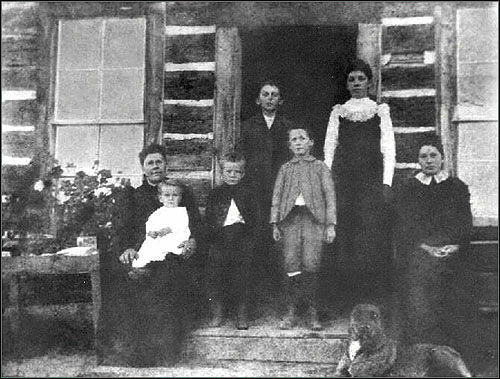
This photo was taken by a traveling photographer in about 1895
in front of the old log house. Mary Jane is holding Claude.
The other children are Card, Orla, Will, Sally, and Lalla.
Corral Creek School
Pa donated an acre for a schoolhouse on the other side of the place, or loaned it, because after the new schoolhouses were built and the old one abandoned, the land was ours again. The schoolhouse was a one-room log building with all eight grades under one teacher. All of our family went there and, when the preacher came around, they had church in it.
When Earl and I were about halfway through the grades, they built two new schoolhouses - one up the crick near the corner of Lal's farm and Koontz's and the other in Corral. By that time the Prairie was fairly well settled and both new schools were filled. They were painted with green roofs and had belfries. In the old one, the teacher came out with a small bell in hand and swung it up and down and the kids came running.
There was a nice coasting hill just above our new schoolhouse, so when the snow was right, most everybody spent the noon hour coasting, some on skis, but most on sleds. Charlie Perkins fell and broke his leg one day which was quite a dramatic event in our lives. Another snow pastime was jumping off the horse shed into the deep snow. At home Earl and I used the cellar to jump from. It was great fun, but once or twice, when the snow was wet, we had trouble getting our feet loose.
We always walked to school and when it snowed a lot, Matt Mink, or some other neighbor would get out his big roller and go over the roads, so it was almost like walking on pavement for a day or two. In the spring after the snow started to melt and froze at night, we could cut right across Simons' field on the crust, crossing over the fences without knowing exactly where they were at first. When the snow got so low that we had to crawl through the fences, we went by the road.
We always had to come home by the road and it usually was melted off on one side of the tracks - the down-side would be very soft and wet - so sometimes it was like walking a tight rope to keep from sinking in.
Spring Time
We always enjoyed hearing the blackbirds sing in the trees along the lane early in the spring. The winters were so long, and the birds came before the snow was gone off and really made music and sounded so happy.
When patches of bare ground would appear, we would look for the little snow flowers (somebody in the family, I think Sallie, gave all the different flowers names - most of them wrong). The snow flowers were sort of ordinary little white flowers with pink markings that liked to grow beside a snow bank. We would dig the roots and eat them.
After the snow was melted off there would be sheets of little flowers, especially pansies, where the ground had not been cultivated. Buttercups were little yellow bells hanging from a bent stem. Another beautiful little purple or lavender flower hung down too, but the opening was at the top and the bottom was a sharp black bill like a bird's. These were larkspurs. Later, out on the flat, there were lots of white lilies with three petals with a dark spot on each petal. We called them camas and were told that the Indians used to dig them for food when other food was scarce.
The Indians came once a year and, before anyone owned it, camped by the Hot Springs and bathed in the warm water when the folks first moved there. They would come and beg for food sometimes. Ma said she wasn't really scared but was always glad when they moved on.
Deer often ran across the fields then, but were all gone before my time. We could still find squaw cabbage greens along the slough for me to gather, though, and we always tried to have at least one mess of them every spring.
The Pasture
One summer Earl and I had a pet lamb that Orla brought us. It was too young to keep up with the herd and they had given it to Orla. Earl made a harness for it and old Nig and hitched them to the little wagon. They worked quite well together too. We loaded all the dolls and the teddy bear in the little wagon and went over to the pasture a few times.
Going to the pasture was one of our favorite pastimes - mine anyway. We went out past the barn and crossed the big slough on a board laid across for a foot bridge beside the ford which was very wide from the banks wearing down. We went past the haystacks on the island, then across the crick (Corral Creek) past the corner of the Jones' place and across the little slough into the wild grass meadow.
It seemed like it was at least two miles, but probably wasn't. We had to crawl through the barbed wire fence, then we could climb up the poles of the corral where the boys rounded up the horses when they wanted to catch some to ride. We walked along the horse trails in the summertime before the hay was cut. After that the meadows were turned into the mowed fields.
On the way back, we usually went into the cemetery and inspected all the tombstones. Some of the graves were fenced with palings, and there were even a few hardy flowers on one or two of the graves. Someone must have come regularly to water them, because it seem to be a very dry spot. Nothing but sagebrush would grow there normally - it was on top of the first foothill. I think Pa donated the ground and, strangely enough, none of our family are buried there that I know of.
Horses
We used to put old Cam or another of the riding horses in the yard to eat the grass. We never heard of such a thing as a lawn mower. Cam was a buckskin colt left behind by some emigrants when he couldn't keep up with the wagons. Since the station master had no use for him, he gave or sold him to our folks.
This was long before I was born, and I guess everyone of the children learned to ride on him. He was as gentle as a dog and used to come to the back door for handouts of scraps of bread or whatever. I'm sure Sallie was the one that babied him because he never did that after I could remember. He must have been past twenty when he died. We found him by the yard fence one winter morning where he had come to be as close to the family as he could.
Sometimes the boys took Earl and me along when they were mending the fences, and it looked like so much fun that we decided to build a fence of our own for a pasture to put our stick horses in. We borrowed some kindling sticks from the wood pile and some twine from the saddle house and made our pasture on a slope of the big slough bank right across from the gate into the barn yard. We stuck sticks into the soft ground and wrapped the twine around them instead of stapling. It made a very nice pasture until the boys discovered it and we had to take it down. They said a horse could trip over it and break his leg.
Pastimes
Another fun thing we had was walking on stilts in the summertime after one of the older boys, Orla I think, made us some. And for a time we played "shinny," knocking an old tin can to a goal with a stick. And there was "hopscotch." We had an ideal place for that in the trail from the front gate to the kitchen door - it being worn to a great width and sandy.
We used to play with the Simons boys as we grew older. Their folks had bought the Jones place, and we would meet them in our lane in the cool of the evening in the summer and play "one ole cat" or "pum pum pull away." There were three of them - Curtis was about Earl's age and the others younger.
Later, Mr. Simons built a dance hall and plunge using the hot water from the Hot Springs. We didn't have to pay to go in the plunge, but everybody else paid 25 cents, I believe. They had ladies bathing suits with sailor collars, V-necks, skirts to the knees and also black stockings. I don't remember what the men and boys wore.
We had lots of fun there and later, when I was old enough, I had fun in the dance hall. All the kids from Corral Creek school would go, and one or two of them had turned out to be not only handsome, but good dancers too. When I first started going and the older crowd came, we used to dance square dances, two steps, and polkas too. Later, when the older ones dropped out, we only did waltzes and one steps. Earl never got to go that I know of because we left before he was old enough, but he didn't seem to care for such nonsense anyway.
Orla, Claude, and Earl were all good on the violin, but the rest of the family were not so gifted. Will was good at whistling and playing the harmonica. Sallie played the organ when she was at home and gave me lessons for a while so, when she paid for lessons for me, I already knew how to read the notes. That was while I was with her in the nurse's home. Lal couldn't carry a tune and I can't remember ever hearing Card sing or even try to. Claude used to play for dances, Orla did too, before I can remember. Earl probably played for dances. I know he told me he played for programs and such at the church there in Richfield and for radio.
Notes
1. Mary was a Thomas, but Susan was a Pugh. Mary was married to Susan's brother Robert Pugh, so they were sisters-in-law, not sisters.
2. Philander and Thurza were married December 6, 1832 in Smyth County, Virginia. Phanney Newton, who was likely a Williams family relative, cosigned the marriage bond with Philander. So the story of 'Thurza buying Philander's bond' probably originated with Thurza's family paying for their marriage bond.
Since Philander was born in New York, it's hard to know where the 'bound servant' story originated, but it could have been that later generations didn't understand the meaning of the marriage bond and assumed it had something to do with being a bound servant.
3. Philander gave his birth place as New York in both the 1850 and 1860 census, so this version of his origins is probably more accurate. Court records show that he may have been the illegitimate child of James McCarter and Mary Fenton of New York City, but this has not been proven.
4. The children of Philander and Thurza McCarter were Martin Van Buren, Levi, Catherine Jane, Andrew, William, Emily, Hugh, James, Sarah, and George.
5. Robert was actually the grandson of Samuel Pugh. Robert's parents were David and Sarah Greer Pugh.
6. The 1860 census lists four slaves in the Pugh household. They probably weren't freed until Robert's death which coincided with the end of the Civil War in 1865.
7. The children of Robert and Mary Pugh were David, Sarah, Jonathan, William, Stephen, Elizabeth, Rhoda, James, Rosamond, Robert Jr., and Mary.
8. Drury and Mary were both born in America and were married on June 6, 1809. The Senter and McClure lines date back to the early 1700s in North Carolina and Virginia. Mary was also a ninth generation descendant of Stephen Hopkins of the Mayflower.
9. There are no records of Drury having owned a store or of Calvin buying the Sam Pugh place, as neighbor Sam Pugh (grandson of old Sam Pugh) was still alive at the time Calvin and Rosa were married in 1854. However, Calvin was Postmaster at Mouth of Wilson from January 26, 1852 to August 24, 1852, so likely did work in a store before he was married.
10. Calvin's opinions about slavery differed from those of his brothers Nathaniel and John. The 1860 Agricultural Census of Grayson County, Virginia shows Nathaniel with one 16-year-old female slave. The 1840 Agricultural Census of Ashe County, Virginia, shows John with three slaves.
Unfortunately, many of our Grayson County ancestors - Bournes, Greers, Pughs, and Thomases - were slaveholders. In 1860, the McCarters owned a 13-year-old girl who must have remained with the family after the Civil War because the 1870 census lists a 24-year-old black servant by the name of "Phany" in their household.
11. According to his service records, Calvin enlisted in Company I of the 51st Infantry Regiment of Virginia on May 16, 1862. One week later he was promoted to full Captain. After serving for six months, he resigned his post because of measles and other chronic conditions. His Civil War Records include his handwritten letter of resignation.
Calvin was never captured, but his older brother John was a POW who spent five months in a camp in New York. John's son Joseph also spent time in that camp and was later killed in action. Also serving in the Confederacy were Calvin's brothers William, James, and Levi as well as his nephews Daniel, Andrew, and Drury. Daniel was also a POW, and Andrew was killed in action.
12. Calvin and Rosamond Senter's children were Kenneth, Mary, Elizabeth, Clara Ellen, Emma, Amelia Ann, Wiley, and Minnie.
13. Research reveals that Jim was living in Orange County, California as early as 1907. He had ranched for several years in Wyoming, before his move to California. William didn't move to the area until sometime after 1912. Read more about William in this biography. Both Jim and Will are buried in the Huntington Beach Cemetery in Orange County.
14. Laurence died when he was squeezed between a wagon load of hay and the side of the barn.
15. Mark, who was also known as "Dutch," was also killed in an accident when his horse fell with him over in the south hills. He was alone and evidently didn't get kicked loose of the stirrup and was drug to death.
